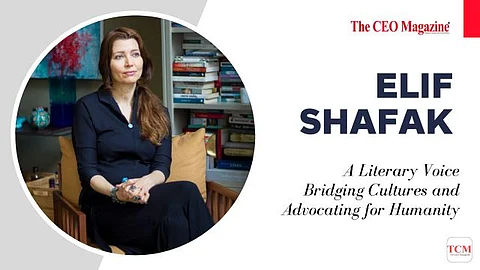

Elif Shafak
A Literary Voice Bridging Cultures and Advocating for Humanity
Elif Shafak, born Elif Şafak in Strasbourg, France, on October 25, 1971, is a renowned Turkish-British novelist, essayist, public speaker, political scientist, and activist.
Her unique ability to craft narratives that seamlessly blend Eastern and Western influences has earned her international acclaim and has sparked important conversations on topics ranging from gender equality to freedom of speech.
With a diverse and prolific body of work, Shafak is a literary figure who continually pushes the boundaries of storytelling while advocating for social change.
Shafak's early life was marked by both cultural diversity and family challenges. After her parents' separation, she returned to Ankara, Turkey, where she was raised by her mother and maternal grandmother.
Growing up in a non-patriarchal environment, she began to develop a unique perspective on gender dynamics and the roles of women in society. Her experiences, both positive and challenging, greatly influenced her future work.
Elif Shafak's academic journey is equally remarkable. She earned a master's degree in women's studies and later obtained a Ph.D. in political science. Her academic pursuits led her to teach at various universities in Turkey and, later, in the United States.
Shafak's diverse educational background equipped her with the knowledge and critical thinking skills that would become integral to her writing and advocacy.
Shafak's literary career began with her first novel, "Pinhan," which received the prestigious Rumi Prize in 1998. Her thought-provoking works, such as "The Bastard of Istanbul" and "The Forty Rules of Love," often explore the intersections of Eastern and Western cultures.
It was "The Bastard of Istanbul" that delved into the contentious issue of the Armenian genocide, leading to her prosecution under Article 301 of the Turkish Penal Code for "insulting Turkishness." Although she was acquitted, this experience prompted her to move to the United Kingdom.
"The Forty Rules of Love" is another testament to Shafak's storytelling prowess. It became a bestseller in Turkey and received international recognition. In the United Kingdom, it was awarded the Prix ALEF* – Mention Spéciale Littérature Etrangère and was nominated for the 2012 International IMPAC Dublin Literary Award.
Shafak's 2019 novel, "10 Minutes 38 Seconds in This Strange World," gained further acclaim by being shortlisted for the Booker Prize. However, this novel also attracted the attention of Turkish prosecutors due to its frank exploration of child abuse and sexual violence.
Istanbul, the vibrant and complex city where Shafak spent significant parts of her life, is a recurring character in her novels. She paints a multifaceted portrait of the city that defies easy categorisation, emphasising how it blends Eastern and Western cultures, traditions, and contradictions.
Feminism and gender equality are other themes close to Shafak's heart. Her writing explores issues like motherhood and violence against women, challenging societal norms and advocating for change.
Human rights have been a significant focus of Shafak's novels. She tackles sensitive topics, such as the persecution of Yazidis and the Armenian genocide, giving voice to marginalised communities and challenging injustice.
Shafak is a fervent advocate for freedom of expression. In a world where divisions between cultures, religions, and ethnicities can create imaginary walls, she believes that literature has the power to bring people together. Her works serve as a reminder of our shared humanity and common joys and sorrows.
Shafak has been critical of the authoritarian direction taken by the Turkish government, leading her to seek refuge in the United Kingdom. She has spoken out against issues like the Twitter ban in Turkey, emphasising the importance of democratic values and freedom of speech.
Shafak's personal life is marked by a commitment to her values. She has been married to Turkish journalist Eyüp Can Sağlık and is the proud mother of a daughter and a son. In 2017, she openly identified as bisexual.
Over the years, Elif Shafak's contributions to literature and her advocacy for human rights and freedom of speech have earned her numerous accolades. From the Rumi Prize for her debut novel to being listed among BBC's "100 most inspiring and influential women," Shafak's work continues to make a lasting impact.
Elif Shafak's literary journey transcends borders and connects cultures, reminding us of the power of storytelling to inspire change and foster understanding. Her unique voice continues to resonate with readers worldwide, making her a beloved figure in contemporary literature.
Follow us on Google News
